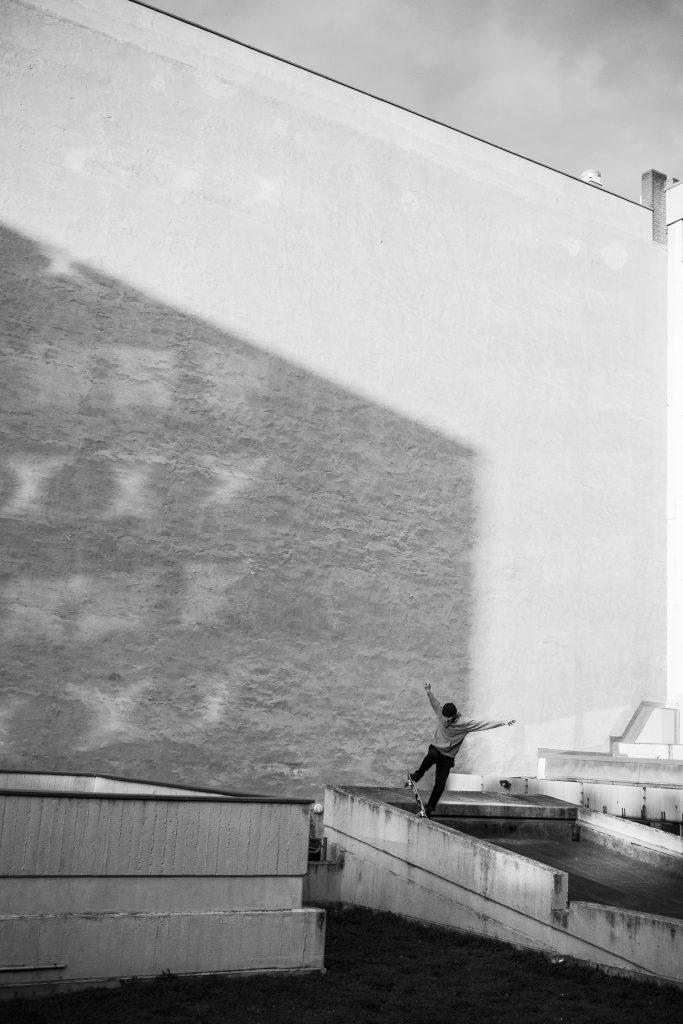
Words by Robin Pailler | Photography by Friedjof Feye
If you’re not familiar with the Berlin skate scene you may not have heard of Malte Spitz.
After being introduced at Winterfeld food market this summer by mutual friend and Place Mag editor-in-chief Daniel Pannemann, we crossed paths again several days later when Malte, Daniel and Nils Brauer invited me on a last minute filming mission for Low Flying Birds. I hadn’t seen Malte skate much before; but within 20 minutes of my arrival, he’d already bagged this impressive line. Backside flipping into the hill, switch bs 180 halfway down and a nose manual on that horrid bricked bump at the bottom is quite a feat on a descent that’s a lot less forgiving than it looks.
Since then Malte’s presence has been prevalent on our IG feed. Whether it be in Pannemann’s S2020 montage, Tempelhof sessions with Michi or showing off his slappy curb variations on Place Mag’s Berlin update, Malte’s clearly been a staple of Berlin’s skate scene for quite some time, having rode for Radio Skateboards for the best part of a decade now.
So when our good friend Friedjof Feye sent over a bunch of photos he’d shot with Malte in Berlin recently, we thought it’d be fitting to sit down and get to know a little bit more about our newly found skateboarding enigma.
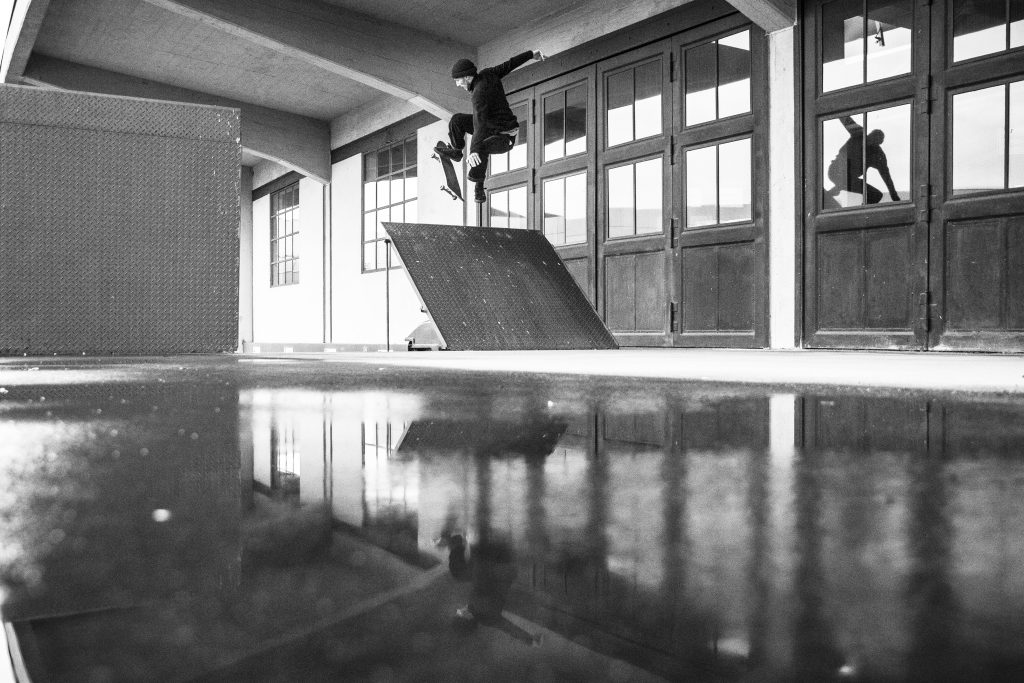
So Malte I heard you’re from Potsdam originally?
Yeah, that might be true.
Might?
Haha, I’m originally from Saxony-Anhalt, which was East Germany back then. I was born in 1990.
Wow. Right after the wall fell down.
Yeah! Right before the unification of Germany.
Crazy.
My parents moved to Potsdam in ’89 but when I was born in ’90, my Mum was at her parents in Saxony-Anhalt.
Gotcha.
But my Dad was already working in the western part of Berlin and so he would travel from East to West Berlin from time to time. So I was raised in Potsdam until ’96, then we moved to a little village nearby and then I moved to Berlin in 2010. But even before that I would go and skate Berlin as I had a couple of older friends and they moved here when I was 17/18.
So how did you first start skating?
I started skating in this little village, actually. A friend of mine had a skateboard. I don’t know why he had a skateboard actually. This was around 2001/2002 I guess. And, yeah, from then on I just skated. He quit one day and then I met some other skateboarders from Potsdam in school. There was a good scene in Potsdam back then, better than today actually. We had an indoor skate park as well, which was basically an abandoned house we were skating and then in the evening we had parties there. Now it’s a parking lot for a dentist surgery.
Who was your first sponsor?
My first sponsor was Radio actually.
How did that come about?
I guess I was skating in Berlin every weekend, and I just met them through Search & Destroy Skateshop and skating the indoor skate park back in the day. I met a few of the guys, Valle etc., and they just started giving me boards. And luckily they never stopped giving me boards. That was around 2010.
So surely it’s coming up to your 10 year anniversary?
Yeah probably. We probably missed it already.
Who influenced you in skateboarding growing up?
Obviously the first skate videos. The 411’s when it was still VHS tapes. I mean, the Berlin scene always influenced me and then my good friend from Potsdam was a little bit of an aura: Konstantin Rutschmann. He was the local hero back in the day and so he influenced me.
Any specific videos?
I mean I always liked the Gravis stuff. Jake Johnson, Dylan Rieder etc. I remember watching the Adio video a lot, One Step Beyond with all that special music and the fast cuts – which now feels pretty far away somehow. The DC video. Ave’s opening part. My good friend Steve (Forstner), the wedgend haha.
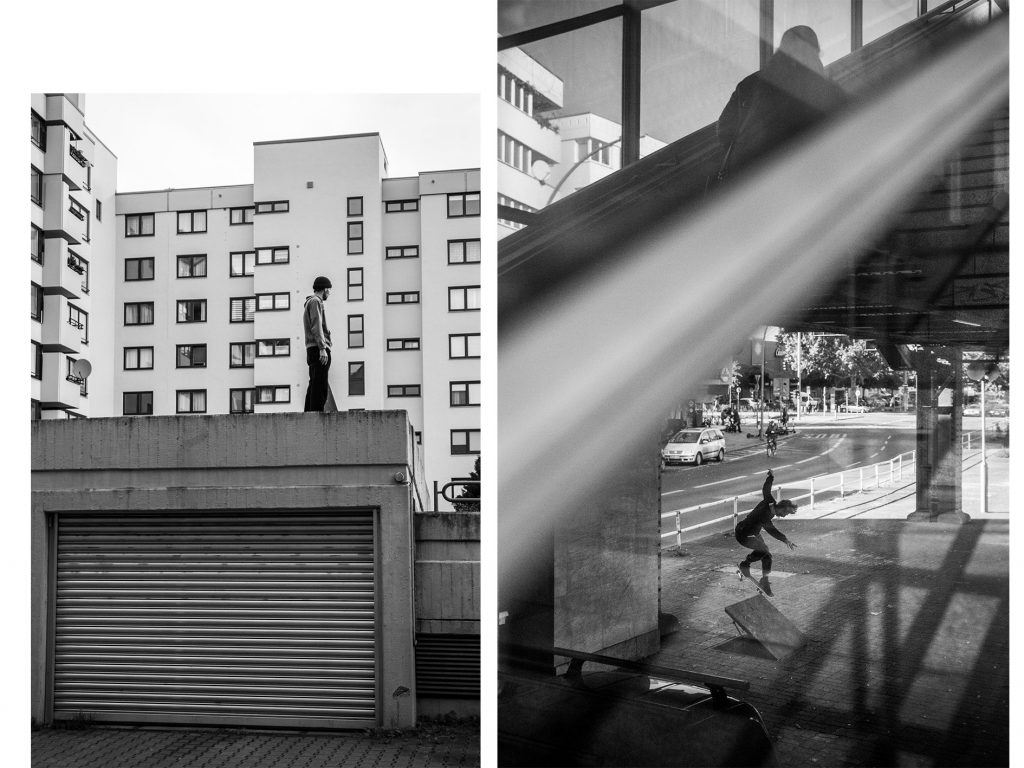
Obviously Friedjof Feye shot all your photos for this piece. He’s played an integral part in German skate media over the years, how did you first meet him?
I definitely met him through Daniel (Pannemann) and Tjark (Thielker). Because they’re all from the same area and they all moved to Berlin except for Friedjof but he was always around, coming to visit. It was also around the time when we did the videos with Jonathan Peters.
It’s funny because this is the first time we actually shot photos together. I mean, maybe we shot one in the past but yeah he was hyped to do it. We actually wanted to go somewhere for Low Flying Birds with Nils but you can’t really travel so we just shot them all here in the space of a week.
How did you meet Tjark and Daniel? Was that just through being in Berlin?
I guess so yeah. We actually did a Cleptomanicx/Radio trip to Copenhagen and Malmo years ago. But I’m not sure if we even spoke to one another back then because it was such a big crew. We had 10 from Radio 10 from Clepto plus all the extras and we were staying in tents and stuff. But yeah it must’ve been around 2011/12. And then I met Daniel through making the Jonathan Peter’s videos I guess. Jonathan was always filming with Valle, and then we kind of came together with Daniel & Tjark also. That’s how we met I guess.
How’s life outside of skating because I hear you’re studying?
I’m doing a PhD, so not studying anymore, but kind of still studying. I studied the history of literature and art, and now I’m doing a PhD on the history of literature and writing some kind of biography on a writer called Hermann Grab from inter-war Prague who went into exile in America.
Wow!
So I’m kinda trying to collect as much information as I can. I actually wanted to go to New York this year as he went there and had a music academy. He’s from Prague and this was the time when in Prague, there was a big cultural scene. German speaking Jews, like Franz Kafka and so on, but he’s a bit younger than Kafka. So there was this big cultural scene until the Nazis destroyed everything and then almost everyone had to flee. Most of them were German speaking Jews. Most of them not Jews in the religious sense anymore but yeah, they are to flee. So Grab moved to Paris at first and then when the Nazis came to Paris he actually went to Biarritz and Bayonne to figure out how the visa stuff worked. Then he went to Lisbon and was waiting for permission to go to New York. He took a boat in 1940 and lived in New York until the end of his life in ’49. He was born in 1903, so he was only 46 when he passed. So he only had a small oeuvre, one big novel, and some smaller short stories. I’m trying to tell this story, and the stories from his books and also his cultural network stuff between Paris, Prague, Vienna, and then later, New York.
It’s rare that you talk to a skateboarder doing a PhD in literature, where did that passion come from?
I’m not really sure anymore, but I guess it was because I had to go to school every day by bus, and it took me 30 minutes and I was always way too early so I had to wait another 30 minutes and one day I just started reading because there was no Instagram back then, haha. Once school finished I was not really sure what to do. I did a big trip to Asia with a friend. And then I came back and always knew that I wanted to go to university but didn’t know what to study. I just started going to the University randomly and sitting in on big lectures without really inscribing. And then I just had started studying literature and the history of arts, because it was interesting.
Do you write yourself?
Yeah but not fiction. It’s more essay form. I always try not to be too scientific. Because I want people who don’t study literature to read the book I’m writing now. So it’s a little more essayistic looking at why we should read these old books now. What does it tell us today? What’s the relevance now. I’m actually currently writing a little presentation for a conference on the past 1700 years of German Jewish history. So I’m doing a presentation on Hermann Grab and his instruments. Because he took his instruments from Prague to America. I wrote the beginning yesterday and tried to have a little artistic beginning, where I’m basically describing the weather in 1940. I tried to get my hands on some information on how the weather was in December 1940 just to make it a little more vivid. I mean, it’s already a crazy story having to flee from Europe, of course. But I mean, it happened to thousands of people. So just trying to figure out extra details to make it special.
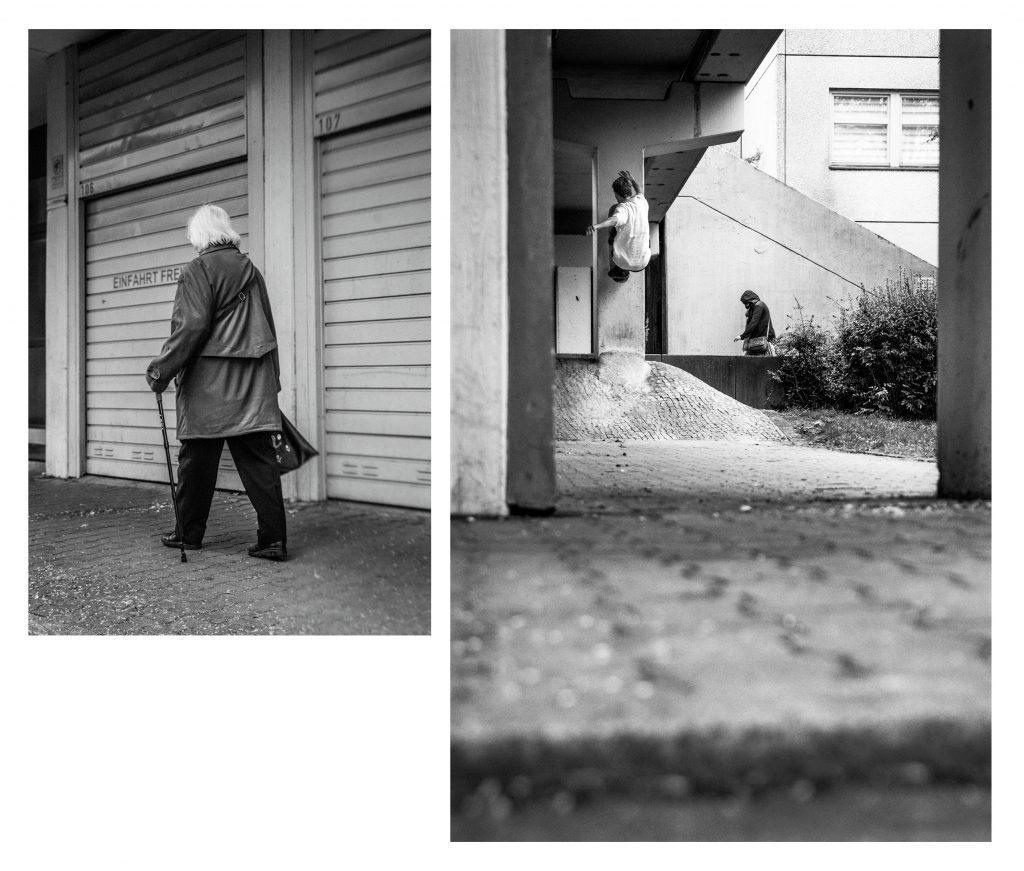 So once you complete your PhD, what would you be looking for a career in long term?
So once you complete your PhD, what would you be looking for a career in long term?
So, I guess long term would be staying at the university. Maybe having a career there as a professor someday. But I’m not sure if I want to do that because being a professor is pretty bureaucratic. So yeah, I’m just thinking step by step. For now I’m getting paid for it until March 2022. Then I’m trying to do what’s called the Post-Doc project, which is just the next project. Thinking about a new theme and then writing a new book about something different. Maybe being part of a group of researchers, doing a big conference, step by step and then afterwards, you can think about writing the final book to become a professor. Or you go to some institution, some cultural institution like an archive, or museum. Some cultural place for literature, that kind of stuff. Or try to be a journalist. But if you want to be a professor someday, I feel more and more that you have to follow the steps in a specific direction. It’s not that flexible any longer.
Which is kinda restrictive.
For sure but for now I’m focused on writing a good book. My professor said, “when you write a good book, then we see what the next step is.”
So how do you make time to go skate?
Well the good thing is that at the moment I can largely decide when I work. There aren’t actually that many deadlines, so I try to give myself deadlines for the chapters and then you have to present the chapters to the professors and staff. That’s the only deadlines. So I can work in the morning for a few hours and then skate in the afternoon. I try again to work in the evening, but I’m not really good at working after skateboarding. I always try to work and then go skate and then have a beer with the boys. But yeah, I mean, it’s a lot of work but you can decide when you do it, so that’s pretty cool. But I guess I skate once or twice a week so it’s not like, every day.
Was there ever a point where you were pushing for to go further with skateboarding? Or have you always been happy to focus on your studies and just enjoying skateboarding for what it is?
I’m not sure if I really tried to go further. I guess there were times where I was pushing but I never really felt like I am able to put everything into it. Because if you want to make it in skateboarding, then you have to invest so much time and so much effort. And perhaps spend time with people you never really get along with. I’m not the guy who’s going to practice for hours at the skatepark, which I felt was more important in the past then it is now. I kinda find it boring and I just love street skating and not figuring out how to do laser flips. But of course I was always happy to get boards, some shoes from time to time and just be able to film videos with my friends.
Are you filming for anything right now?
I’ve been filming a little bit with Nils (Brauer) and Daniel for what will be Low Flying Birds II. I’ve already got some tricks, maybe I’ll get some more…
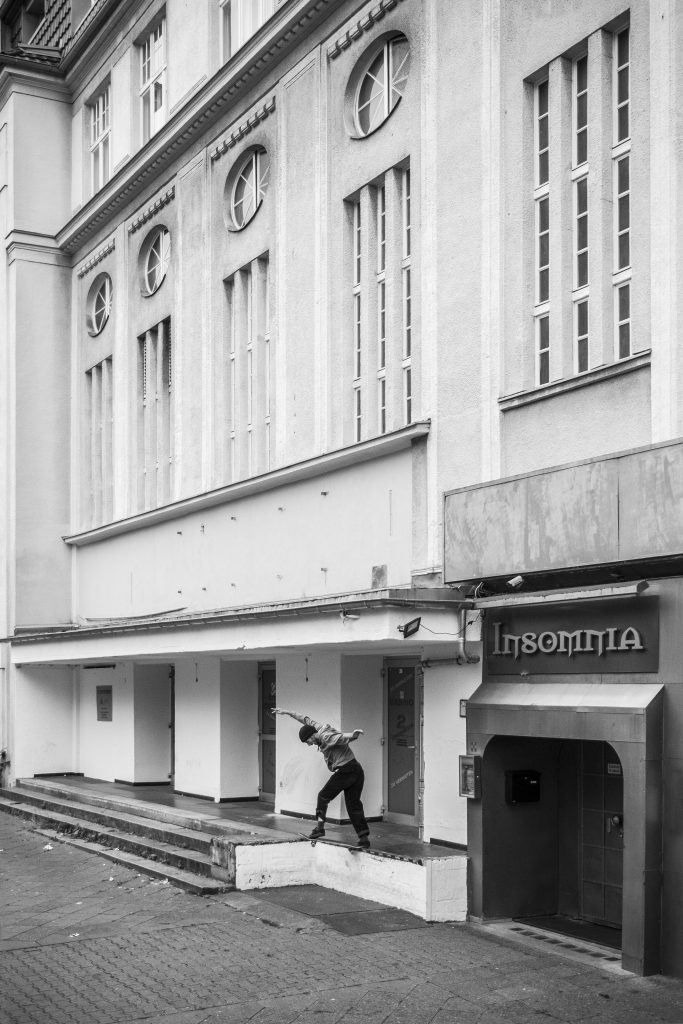
How did that project come about? Because Low Flying Birds kinda started out as Daniel’s project with Nils right? And then it kinda grew into something else?
It feels like that now but I’m not sure what the real plan is for the second one. In the beginning the idea was Daniel and Nils having a shared part. Then Nils got hurt, so the focus was on Daniel. And so then the focus of the second one would be a bigger part from Nils. But I guess they’ll just see what happens. In the first one the cameos were just random I think. We’d go skating together, we’d skate a spot. I’d do a trick and we’d film it.
I know Tjark’s already got clips for the next one which Nils seems super hyped on.
Yeah they also already registered for next years Vladimir Festival haha.
It feels like you guys have a really tight crew and the fact you’re all part of the older scene now I guess.
For sure but I mean it’s still Nils and Daniel’s thing. They like to work together so essentially they’re doing a video and the rest of us will have some tricks thrown in. I’m just keen to get some tricks and eventually go on some trips with them to wherever.
What gets you hyped on skateboarding right now?
I mean, I still enjoy watching skate clips. The Parisian scene is really cool these days. They have so many good skaters and all these new clips dropping constantly. It seems every week there’s a new kid from Paris, who skates creatively in a new way and joins the well known crews. I mean, Paris has always had a more influential skate scene than Berlin of course. We have like one or maybe two wider recognized videos a year. Also, the industry didn’t really support the younger generation here as they did in Paris for example. Years ago, I first heard that Nozbone pays their team riders some money, a shop like Search & Destroy would never be able to do that. In regards to the younger skaters being supported in different ways, that seems to change a little now. Still, the Berlin scene is quite separated in a way, which kind of represents the city’s cultural networks in general. There’s obviously plenty of crews and everyone knows each other but you don’t really have too much contact. Like, I’ll skate a bunch with Daniel, Nils, Tjark etc., but then sometimes we can go several weeks without contact. Without anyone having any bad feelings, just doing our thing. Most of the time I’ll go skate with Valle, Biemer, Steve Forstner and my friend Dennis or Lukas. We should start a little something ourselves that gets us hyped.
Before you go can you give us 5 essential pieces of literature you think are worth checking out?
This is the book about migration, it’s tragedies and it’s allurements. Set in 1940 in one of the most important harbours of European history, the Mediterranean city of Marseille becomes a symbol for the nomadism of humankind. To see a straying fugitive dedicate himself to antifascism or when you feel some pushes of wanderlust: call your bookseller next door, ask for the hardcover and put a smile on his or her face.
J.D.Salinger: The Catcher in the Rye
Probably best read when you’re between the age of 16 and 20, this book is a vivid description of (every)ones alienation from the parental world. While diving into Holden Caulfield’s world you discover that you’re already sensing what’s written in the next sentence. Simply because you somehow feel alike without having necessarily experienced the same stuff the protagonist went through – and its from the 1940s! So, as Holden himself would put it: “Go get yourself a scotch and soda and read that phony little piece of literature!”.
Peter Weiss: The Aesthetics of Resistance
If you want to read one book about European history, get your hands on this admittedly challenging book by the novelist, filmmaker and painter Peter Weiss. In this barely fictitious memoire he interrelates the eagerness between the history of art, the battles of the working class towards fascism and the ageless necessity of every individual to decide what is worth living and what is worth fighting for. It’s an adventure in every possible way – I promise!
Amos Oz: A Tale of Love and Darkness
The title of this story about the early years of the state of Israel gives off a wrong first impression, since it’s admittedly pretty cheesy. But in a way this memoire is the truest account of all the people being confronted with each other in this desert strip we call Israel today. Before even beginning to think about who is friend and who is foe, I’d urge everyone to read this book. It’s a long lasting and complex conflict that too many people seem to have a simplified stance on.
William Finnegan: Barbarian Days
Skateboarding is still waiting for a book that ties the passion and rationalization of the thing we all love doing. Until it arrives, read William Finnegan’s story of his life – in the balancing act between being a globetrotter and becoming one of the most elaborative American journalists today. In a wise manner this account does not only keep the magic of all surfing related aspects of this world, it also manages to intensify the love for our passion through its wisdom.



